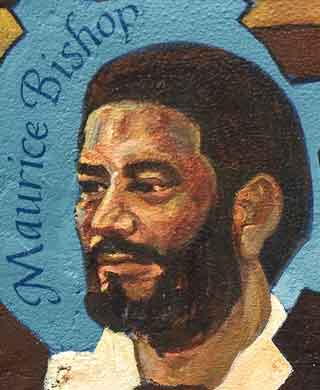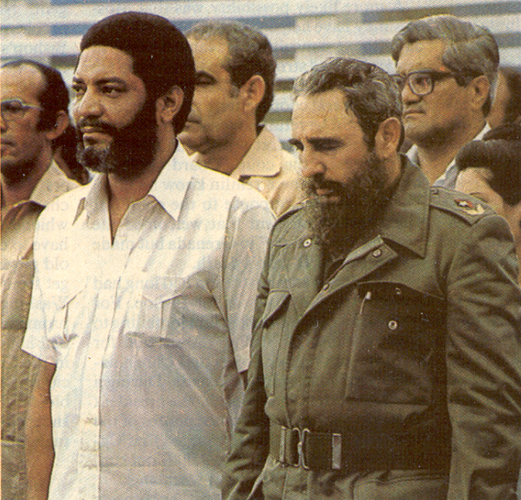 |
| Excerpt of speech by Maurice Bishop (1 MB mp3) From Freedom Archives audio archives Photo: Scott Braley |
 |
| Excerpt of speech by Maurice Bishop (1 MB mp3) From Freedom Archives audio archives Photo: Scott Braley |
Maurice Bishop was the Prime Minister of Grenada from March 1979 until October 1983 when he was executed at Fort Rupert. Maurice grew up in the British-controlled Caribbean island of Grenada. Like many people in the country, Bishop led a poverty-stricken childhood due to a lack of industrialization and Britain's lack of concern for the Grenadians' well-being.
Bishop had formed the New Jewel Movement (NJM) in 1973; Bishop's NJM became the chief opponent party to Sir Gairy. Though the island's population numbered below 100,000, Bishop and the NJM was able to rally tens of thousands against the dictatorship of Gairy. In retaliation, Gairy unleashed his fascistic henchmen, who called themselves the "Mongoose Gang." They were responsible for the deaths of many strikers in Grenada, including Maurice's father Rupert.
In 1979, Bishop and his comrades learned of a plan put forward by Gairy to assassinate the NJM's leaders while the dictator was out of the country. In March of that year, they were able to thwart it with a bloodless seige which took over the nation's single radio station. With the mass support of the people, Bishop came to power and Gairy found himself without a regime to return to.
Bishop installed a revolutionary government that went to work organizing workers' councils and creating a very participatory government. He worked to develop the island, and received aid mainly from Cuba and the Soviet Union, and later — the Sandinistas of Nicaragua. One of the chief efforts of Maurice was the construction of a airplane runway in order to further tourism for the nation. Bishop was closely influenced by the ideas of Cuban leader Fidel Castro and Nicaragua's Daniel Ortega. Being the only English-speaking of this Caribbean triad, Bishop hoped to appeal to the working-class of United States – especially the oppressed African American population.
While Bishop's government and life were cut short tragically by extremists from both ends of the political spectrum, he remains a light of hope for socialists who see his participatory and egalitarian regime as a perfect example of how a workers' and peasants' government can be arranged.

Photo credit: www.latinamericanstudies.org
More: More Info